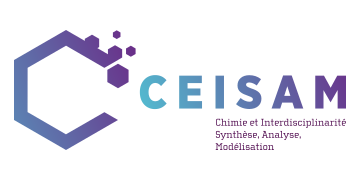Mikaël CROYAL will give a CEISAM-certified conference “Analytical chemistry and translational research: cardio-metabolic impacts of apolipoprotein glycation in diabetes”, on Friday May 24 at 10:30 a.m. in the Marie Curie room.
Analytical chemistry and translational research: the cardio-metabolic impact of glycation of apolipoproteins in diabetes
Cardiovascular disease (CVD) is the leading cause of death in patients living with diabetes, and especially CVD related to atherosclerosis development (i.e. the progressive lipid deposition within the arteries). Because traditional clinical markers do not fully capture this increased risk, novel early biomarkers of diabetes-associated CVD are urgently needed to improve the clinical management of diabetes. In this respect, proteins are reliable biomarkers for the early detection of diseases, and their post-translational modifications (PTM) have emerged as essential for understanding the mechanisms involved in organ failure. Besides, Protein PTMs are sensitive to the metabolic environment associated with diabetes, and PTM-related structural changes may affect the functions and metabolism of key proteins for the regulation of energy homeostasis. Beyond chronic hyperglycaemia, diabetes is also associated with numerous disorders in the metabolism of lipoproteins, which are macromolecular complexes responsible for transporting lipids through the circulation. Interestingly, apolipoproteins are the protein component of lipoproteins and circulate in abundant concentrations in the blood. They control lipoprotein metabolism and are involved in several pro- and anti-atherogenic processes. it has been reported that plasma apolipoproteins can predict CVD better than plasma lipids. Therefore, our driven hypothesis is that the hyperglycaemic environment associated with diabetes could overexpose apolipoproteins to PTMs, and especially the glycation. The resulting changes in apolipoprotein structures may affect their functions in lipoprotein metabolism which might contribute to the residual CVD risk observed in patients living with diabetes. In particular, this research is targeting the glycation of apolipoproteins by methylglyoxal, an atherogenic metabolite produced from glycolysis, to identify new early biomarkers of CVD in diabetes and to understand the associated pathophysiology.
Mikaël CROYAL

Mikaël CROYAL (PhD) is a Research Engineer at Nantes University and has been technical manager of the University’s “M-shark” mass spectrometry platform since 2015. He carries out his research activity within the Team IV “Cardio-metabolic diseases” (Directors: Pr B. CARIOU and Dr C. LE MAY) at the “Institut du thorax” in Nantes (INSERM UMR1087/CNRS UMR 6291). Mikaël CROYAL is more specifically interested in the targeted and non-targeted exploration of plasma lipoprotein components (lipids and apolipoproteins) in a context of cardio-metabolic diseases. His work aims at studying specifically apolipoproteins as pathological biomarkers, based on translational research in conjunction with the ”Endocrinology, Diabetology and Nutrition” Clinical Investigation Centre at the Nantes University Hospital’s Thorax Institute. His work has enabled the team to improve its methodological approaches by developing new analytical strategies for quantifying apolipoproteins on a cohort scale, determining their main genetic polymorphisms and assessing their synthesis and catabolism fluxes using stable isotope kinetic protocols in humans. Mikaël CROYAL leads international and national collaborative projects (ANR, Foundations). He is also a partner in several national and international research projects on lipoprotein metabolism. He is the author or co-author of 84 publications (h-index: 25), and co-responsible for the Corsaire inter-regional platform (Biogenouest).

